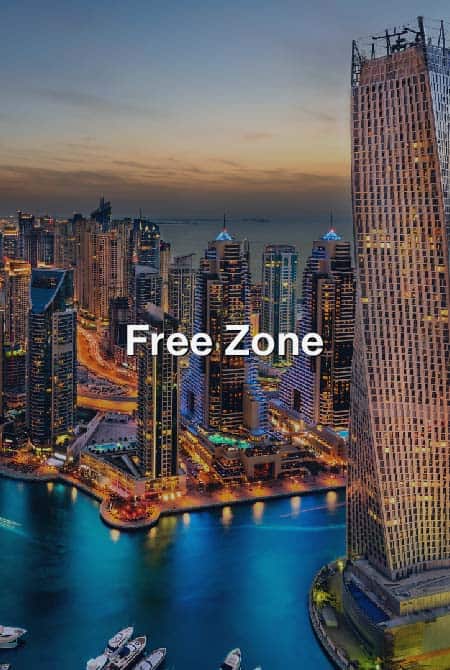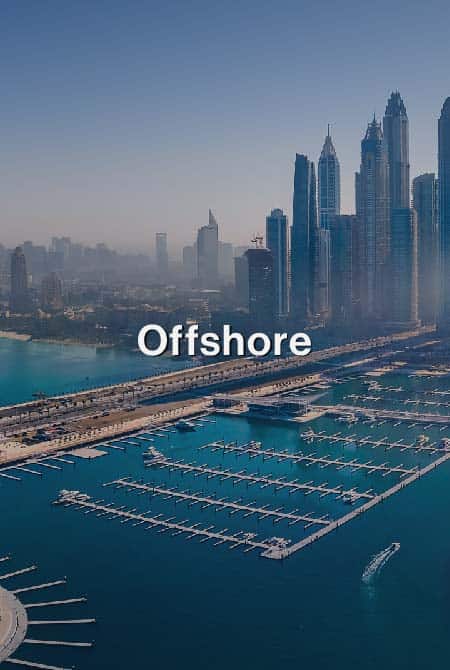Dubai, the crown jewel of the United Arab Emirates, is a city that needs no introduction. This city has become a popular destination for immigrants looking for new opportunities and experiences. It’s no wonder that this Emirati marvel attracts a growing number of expats each year who choose to immigrate to Dubai. In fact, over 85% of Dubai’s population is foreign-born.
For those looking to immigrate to Dubai, several options are available. A common way is through a work visa, where individuals secure employment with a company in Dubai. Another option is an investor visa for those looking to start a business or invest in the city. Additionally, Dubai offers residency visas for retirees, students, and freelancers, making it a welcoming destination for individuals from all walks of life.
If you’re among those planning to immigrate to Dubai, you’re at the right place. We’ll explain everything and explore different ways to make this city of gold your new home.
Why Immigrate to Dubai, UAE?
People immigrate to Dubai because the UAE offers world-class health, education, transportation and general living standards. here are numerous advantages:
1. Tax-Free Living
Dubai or Abu Dhabi in the UAE is a tax haven, with no income tax for individuals and low corporate taxes. This means you get to keep more of your money, which can significantly boost your savings and standard of living. The dream to immigrate to a tax-free in a country isn’t a dream anymore.
2. Career Opportunities
Dubai has a booming economy with a strong job market, especially for skilled professionals. There are many multinational corporations and businesses in Dubai which offer a wide range of opportunities across various sectors.
3. Travel Hub
Dubai’s geographical location makes it a major travel hub, with easy access to Europe, Asia, and Africa. In fact, Dubai International Airport is one of the busiest in the world.
4. Free Zones
Dubai has numerous free zones catering to various industries. Businesses immigrating to Dubai’s freezones have significant advantages like 100% foreign ownership, exemption on corporate and income tax, and streamlined customs procedures which make them ideal for establishing businesses with minimal bureaucracy.
5. Family-Friendly
Immigrating to Dubai offers a high standard of living with excellent schools, healthcare facilities, and many family-oriented activities. Theme parks, water parks, museums, and kid-centric events provide endless entertainment options for families.
6. Visionary Leadership
Dubai’s leadership is focused on ambitious future plans, including the Dubai 2040 Urban Master Plan, which aims to make Dubai one of the world’s best cities to live and work in.
How to Immigrate to Dubai?
To get a visa to Dubai you either need a Dubai work permit visa or an Investor Visa. There are several ways to immigrate to Dubai – the most adopted is by getting permanent residency, in case you have a business in UAE or a job.
Immigrating to Dubai typically involves obtaining a residency visa that allows you to live and work there.
A residence visa is the key to living legally in Dubai, or immigrating to Abu Dhabi, or any of the other emirates in the UAE. It essentially functions as a permit that allows you to reside in the country for a specific period. Here are the ways you can obtain a residence visa:
1. Work Visa
Employment visa or work visa is the most common visa type. It’s sponsored by your employer and allows you to live and work in Dubai for the duration of your employment contract (usually 2-3 years, renewable).
Compared to investor visas or Golden Visas, obtaining an employment visa can be a more direct route to residency in Dubai, especially if you have in-demand skills.
General Directorate of Residency and Foreigners Affairs (GDRFA) is the government department that manages visas and residency permits in Dubai.
Once your work permit is approved by the Ministry of Human Resources and Emiratisation (MoHRE), your employer will then apply for your residence visa through GDRFA. This visa allows you to live and work legally in Dubai for a specific period (typically 1, 2, or 3 years).
GDRFA also handles other immigration-related services like issuing Emirates ID cards, which function as a national identification document in the UAE.
2. Investor Visa
Dubai Investor Visa offers a path to residency in Dubai for individuals who invest a significant amount in the emirate’s economy. This visa type is attractive to those seeking a foothold in the region and the benefits of Dubai living, while also potentially generating returns on their investment. Dubai investor visa is the popular ways among entrepreneurs to immigrate to Dubai.
There are two main ways to qualify for an Investor Visa in Dubai:
- You can either start a new company in Dubai with a minimum capital investment of AED 10 million or become a partner in an existing company with a minimum investment of AED 10 million.
- Another option is to invest a minimum amount in freehold property in Dubai. The property must be off-plan (under construction) or completed at the time of purchase.
Who is the Dubai Investor Visa Best For?
The Dubai Investor Visa is a good option for those who:
- Have a substantial amount of money to invest.
- Are interested in establishing a business presence in Dubai.
- Want to live in Dubai and enjoy the benefits of residency.
- Have a tolerance for some investment risk.
3. Golden Visa
This visa is a long-term residency & immigration option (5 or 10 years) aimed at attracting investors, entrepreneurs, and talented professionals. Eligibility requirements vary depending on the category (e.g., investment in a business, exceptional skills).
4. Student Visa
Dubai is increasingly becoming an education hub. If you enroll in a full-time program at a recognized university or higher education institution in Dubai, you can qualify for a student visa and can easily immigrate to Dubai.
5. Retirement Visa
Retirement Visa is for financially independent individuals over 55 years old with proof of sufficient income to support themselves.
6. Freelance Visa
Dubai offers a relatively new Freelance Visa option. This visa caters to freelancers and remote workers who meet specific income criteria (usually a minimum annual income of AED 360,000. This visa allows you to live and work in Dubai but restricts you from directly working for a local company.
Steps to Immigrate to Dubai, UAE
Immigrating to Dubai involves several steps, including obtaining the appropriate visa, preparing necessary documentation, and adhering to local regulations. Here’s the general immigration process:
1. Choose Your Visa
Dubai offers various visas catering to different purposes. Popular options include work visas, investor visas, golden visas, and student visas. Research each option thoroughly to find the one that aligns with your goals (employment, investment, education, etc.).
2. Secure Necessary Documents
The documents required will vary depending on your chosen visa type. However, some common documents include:
- Valid passport (with at least 6 months validity)
- Passport-sized photographs
- Educational certificates
- Medical test results
- Proof of income (for some visas)
- Job offers letter (for employment visas)
- Property ownership documents (for investor visas)
- Business plan
3. Apply for Your Visa
The application process typically involves submitting the required documents to the Dubai Immigration Department or a visa processing agency. You may need to pay processing fees and attend medical tests.
4. Wait for Approval
Processing times can vary depending on the visa type and workload of the authorities. Be prepared to wait for several weeks or even months.
5. Receive Your Visa and Emirates ID
If your application is successful, you’ll receive your visa stamped on your passport. Upon arrival in Dubai, you’ll need to collect your Emirates ID, which serves as your residency permit.
The New Immigration Law in the UAE
The core legislation governing immigration in the UAE is Federal Law No. 6 of 1973 Concerning Immigration and Residence. However, this law is amended and supplemented by various decrees and cabinet decisions.
Here are some of the key features of the new system:
- Five-Year Green Visa: This visa allows skilled workers and freelancers to live and work in the UAE for five years without needing a company sponsor. Green visa holders can also sponsor their families.
- Multiple-Entry Tourist Visa: This visa offers a longer stay option for tourists, allowing them to stay for up to 90 days with the possibility of extensions.
- Expanded Golden Visa: The validity of the Golden Visa has been increased to ten years. This visa is aimed at attracting investors, entrepreneurs, and individuals with exceptional talents.
The overall reforms aim to make the UAE a more attractive destination for skilled professionals and foreign investors. This is achieved by offering longer visa durations, residency options without employer sponsorship, and a more streamlined application process.
Things to Consider When You Immigrate to the UAE
Moving to the UAE is an exciting opportunity, but there are essential considerations to ensure a smooth transition. Here are essential things to consider while immigrating to Dubai:
1. Manage Your Visa and Work Permit
You’ll require a visa and a work permit to reside and work in the United Arab Emirates. A work permit, sometimes known as a labor card, is required to work in the UAE. The Ministry of Human Resources and Emiratisation issues these papers (MoHRE).
Your company is legally obligated to arrange a work and residency permit for you to safely immigrate to Dubai. However, there are steps you may take to get the process started. Note that this is the paperwork that proves you have the authority to enter the nation. One of these can be obtained through the UAE’s e-channels portal or a variety of government-sponsored applications.
2. Take Care of Your Finances
Given the UAE’s role as the Middle East’s financial center, it should come as no surprise that obtaining financial services, such as opening a business bank account, is rather straightforward. You’ll be able to make a quick phone call after your resident visa has been approved, and the rest will be taken care of for you.
Some immigrants choose to use foreign bank accounts, such as those established in their native country. Shifting to a local account, on the other hand, has advantages. It only takes a couple of days to set up an account. You can begin the process with your authentic passport, a copy of your visa and residency authorization, salary proof, and your Emirates ID.
3. Choose a Business Activity
The UAE offers a variety of free zones and mainland options for company formation. Each zone has its own regulations and business activities it allows. Carefully research and choose the location that best suits your business activity.
4. Taxation
The UAE has a territorial tax system, meaning you typically only pay tax on income generated within the country. Corporate tax was recently introduced, but it applies to specific business activities and profit thresholds. It’s important to understand the potential tax implications for your business.
Stress-Free Immigration to Dubai? It’s Possible!
Moving to Dubai can open a lot of great opportunities, from earning tax-free income and finding exciting job prospects to enjoying a luxurious lifestyle and experiencing diverse cultures.
For an even easier transition, consider working with a trusted business setup consultant like Shuraa. Our experts at Shuraa can help you with everything you need, from registering your company and getting the right licenses to handling paperwork, visa applications, PRO services, finding office space, and much more. Our support can make your move to Dubai as easy and stress-free as possible.
Get in touch today at +971 44081900 or WhatsApp at +971 507775554 or drop an email at [email protected].
Start your new journey in Dubai with confidence, knowing you have expert help to guide you every step of the way. Welcome to your new home!
Frequently Asked Questions
1. Which are the best ways to immigrate to Dubai?
The best ways to immigrate to Dubai, Abu Dhabi, and the UAE.
Popular options include:
- Work Visa: Requires a job offer from a UAE-based company.
- Investor Visa: Invest a minimum amount in real estate or a company.
- Golden Visa: Aimed at attracting investors, entrepreneurs, and talented professionals with specific eligibility criteria.
- Other options: Student Visa, Marriage Visa, Freelance Visa, Outstanding Talent Visa, Specialist Doctor Visa (each with specific requirements).
2. What are the benefits of immigrating to Dubai?
Dubai offers a high standard of living with sunshine, excellent infrastructure, and a tax-free environment. It boasts a multicultural society, world-class entertainment, and strategic access to global markets.
3. Can I obtain citizenship in the UAE?
Obtaining citizenship in the UAE, also known as Emirati nationality, is generally quite difficult for foreigners. Unlike some other countries, there isn’t a straightforward path to citizenship through permanent residency.
4. How much money do I need to immigrate to Dubai?
Financial requirements vary depending on the visa type. Investor visas require a minimum investment, while work visas typically don’t. However, you’ll need to demonstrate sufficient funds for living expenses.
5. Do I need to learn Arabic to live in Dubai?
Arabic is the official language, but English is widely spoken in business and daily life. While learning basic Arabic can be helpful for cultural immersion, it’s not essential for everyday living in Dubai.











